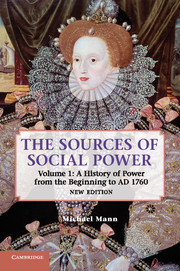Book contents
- Frontmatter
- Contents
- Preface to the new edition
- Preface
- 1 Societies as organized power networks
- 2 The end of general social evolution: how prehistoric peoples evaded power
- 3 The emergence of stratification, states, and multi-power-actor civilization in Mesopotamia
- 4 A comparative analysis of the emergence of stratification, states, and multi-power-actor civilizations
- 5 The first empires of domination: the dialectics of compulsory cooperation
- 6 “Indo-Europeans” and iron: expanding, diversified power networks
- 7 Phoenicians and Greeks: decentralized multi-power-actor civilizations
- 8 Revitalized empires of domination: Assyria and Persia
- 9 The Roman territorial empire
- 10 Ideology transcendent: the Christian ecumene
- 11 A comparative excursus into the world religions: Confucianism, Islam, and (especially) Hindu caste
- 12 The European dynamic: I. The intensive phase, a.d. 800–1155
- 13 The European dynamic: II. The rise of coordinating states, 1155–1477
- 14 The European dynamic: III. International capitalism and organic national states, 1477–1760
- 15 European conclusions: explaining European dynamism – capitalism, Christendom, and states
- 16 Patterns of world-historical development in agrarian societies
- Index
- References
9 - The Roman territorial empire
Published online by Cambridge University Press: 05 July 2013
- Frontmatter
- Contents
- Preface to the new edition
- Preface
- 1 Societies as organized power networks
- 2 The end of general social evolution: how prehistoric peoples evaded power
- 3 The emergence of stratification, states, and multi-power-actor civilization in Mesopotamia
- 4 A comparative analysis of the emergence of stratification, states, and multi-power-actor civilizations
- 5 The first empires of domination: the dialectics of compulsory cooperation
- 6 “Indo-Europeans” and iron: expanding, diversified power networks
- 7 Phoenicians and Greeks: decentralized multi-power-actor civilizations
- 8 Revitalized empires of domination: Assyria and Persia
- 9 The Roman territorial empire
- 10 Ideology transcendent: the Christian ecumene
- 11 A comparative excursus into the world religions: Confucianism, Islam, and (especially) Hindu caste
- 12 The European dynamic: I. The intensive phase, a.d. 800–1155
- 13 The European dynamic: II. The rise of coordinating states, 1155–1477
- 14 The European dynamic: III. International capitalism and organic national states, 1477–1760
- 15 European conclusions: explaining European dynamism – capitalism, Christendom, and states
- 16 Patterns of world-historical development in agrarian societies
- Index
- References
Summary
The history of Rome is the most fascinating historical laboratory available to sociologists. It provides a 700-year stretch of written records and archaeological remains. They show a society with recognizably the same core identity over that period of time, yet adapting continuously to the forces created by its own, and its neighbors', actions. Many of the processes observed in the course of this chapter were probably also present in several earlier societies. Now, for the first time, we can clearly trace their development.
The interest of Rome lies in its imperialism. It was one of the most successful conquering states in all history, but it was the most successful retainer of conquests. Rome institutionalized the rule of its legions more stably and over a longer period than any other society before or since. I will argue that this empire of domination eventually became a true territorial empire, or at least had about as high a level and intensity of territorial control as could be attained within the logistical constraints imposed on all agrarian societies. Its power had a fundamentally twofold base, refining and extending the two principal thrusts of power development of earlier empires. First it developed a form of the organized power of compulsory cooperation, to which I will apply the label of the legionary economy. Second it developed the authoritative power of class culture to the point where all conquered elites could be absorbed into the Roman ruling class.
- Type
- Chapter
- Information
- The Sources of Social Power , pp. 250 - 300Publisher: Cambridge University PressPrint publication year: 2012



